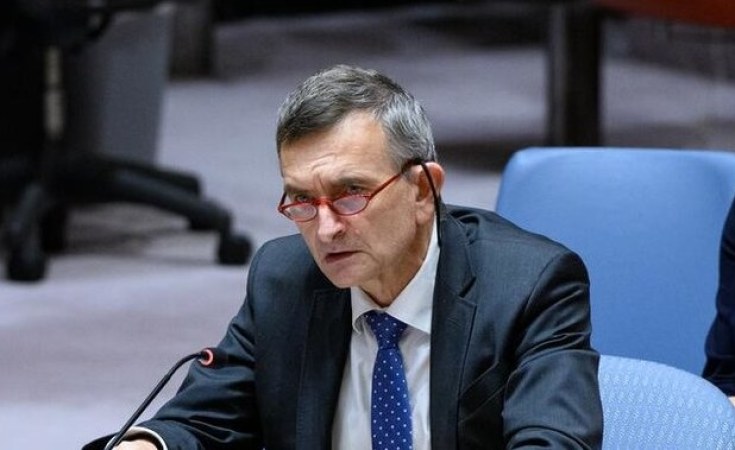United Nations — The United Nations' top envoy in Sudan is stepping down, four months after being told by the government to leave. In parting remarks, he criticized Sudan's military and the rebel Rapid Support Forces, or RSF.
"This conflict is leaving a tragic legacy of human rights abuses," Volker Perthes told a Security Council meeting on Wednesday. "Indiscriminate attacks against civilians committed by the warring parties constitute gross violations of human rights."
The United Nations says at least 5,000 people have been killed and more than 12,000 injured since fighting erupted between rival generals on April 15. More than 5 million Sudanese are now displaced -- more than a million of them as refugees in neighboring countries.
Of particular concern is escalating ethnically targeted fighting in the Darfur region. The region saw wide-scale ethnic violence and crimes against humanity in the early 2000s, and the U.N. fears a repeat now.
Perthes said hundreds of ethnic Masalit have been killed in El Geneina and other parts of West Darfur. The U.N. has also received credible information about the existence of at least 13 mass graves in El Geneina and the surrounding areas. RSF and their allied Arab militias have been attacking civilians in this region.
The envoy said there is "little doubt about who is responsible for what" in the conflict.
"Often indiscriminate aerial bombing is conducted by those who have an air force, which is the Sudan Armed Forces," Perthes said. "Most of the sexual violence, lootings and killings happen in areas controlled by the RSF and are conducted or tolerated by the RSF and their allies."
Perthes said both sides are arbitrarily arresting, detaining and even torturing and executing civilians.
"We need to impress on the warring parties that they cannot operate with impunity, and there will be accountability for the crimes committed," he said.
A group of Security Council diplomats issued a statement expressing alarm about the rampant use of sexual violence in the conflict.
"Reports of rape, including gang rape, sexual slavery, abduction, and sexual harassment have been prominent throughout the conflict," it said. "Women and girls, particularly in the Darfur region, are subjected to horrifying acts of sexual [violence] and reports of gender-based violence as a tactic of war to instill fear and control in the population and assert dominance over local communities."
The diplomats urged the warring parties to stop such violence and uphold their obligations under international humanitarian law.
No peace in sight
Efforts to halt the fighting have so far failed, despite regional efforts by the African Union and the east African regional bloc IGAD, as well as the United States, European Union, Saudi Arabia and some of Sudan's neighbors.
When asked about the situation by VOA at a news conference on Wednesday, U.N. Secretary-General Antonio Guterres said the best way to solve Africa's problems is with African solutions.
"Unfortunately, we are witnessing a never-ending series of terrible fighting with dramatic impacts on civilian population, and this is absolutely intolerable," he said. "I think that the international community must come together to tell those that are leading the fight in Sudan that they need to stop. Because what they are doing is not only the destruction of their own country but is a serious threat to regional peace and security."
In the meantime, the humanitarian crisis is rapidly worsening: displacement at the rate of a million persons per month, a collapsing health care system and growing hunger.
The United Nations warns that 6 million Sudanese are on the brink of famine.
"If the fighting continues, this potential tragedy comes closer to reality every day," Edem Wosornu, head of the operations and advocacy at the U.N.'s Office for the Coordination of Humanitarian Affairs, told council members.


